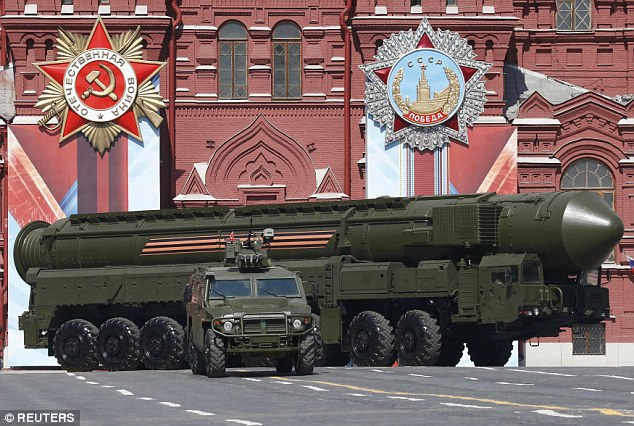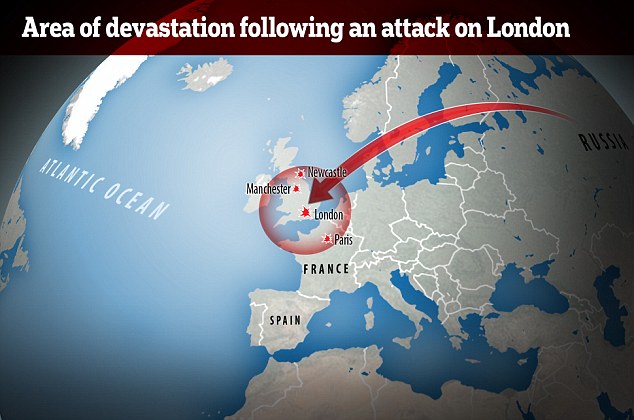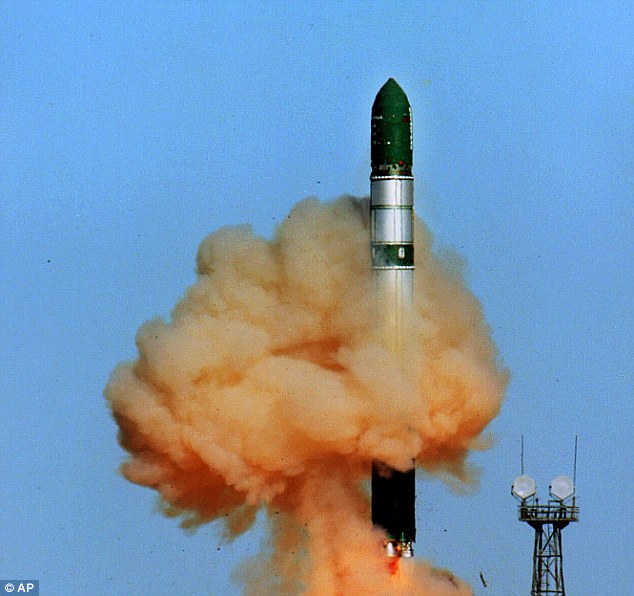خره مينه لګته وي
FULL MEMBER

- Joined
- Jul 7, 2014
- Messages
- 1,767
- Reaction score
- 0
- Country
- Location
Bomb shelters are upgraded, gas masks tested amid strained relations between Putin and U.S.

Cold War-era Soviet Union survival tactics are back in vogue as Russians by the millions participated in emergency drills across the country in early October. The test-runs come amid heightened tensions with the U.S. Photo: AP Photo/Ministry of Emergency Situations press service via AP
By
THOMAS GROVE
MOSCOW—Russian authorities have stepped up nuclear-war survival measures amid a showdown with Washington, dusting off Soviet-era civil-defense plans and upgrading bomb shelters in the biggest cities.
At the Kremlin’s Ministry of Emergency Situations, the Cold War is back.
The country recently held its biggest civil defense drills since the collapse of the U.S.S.R., with what officials said were 40 million people rehearsing a response to chemical and nuclear threats.
Videos of emergency workers deployed in hazmat suits or checking the ventilation in bomb shelters were prominently aired on television when the four days of drills were held across the country. Students tried on gas masks and placed dummies on stretchers in school auditoriums.
The capital’s civil-defense plans are also being upgraded, said Andrey Mishchenko, deputy head of the ministry.
“An inventory was taken in Moscow of the city’s underground spaces, in order to allow us to plan for sheltering 100% of the city’s population,” he said, as reported by state news agency RIA Novosti.
In parallel, commentators on state-dominated airwaves issued some of the shrillest anti-American rhetoric in years. “Russia is sick of America’s arrogant lies,” influential commentator Dmitry Kiselyov said this month after a Syrian peace plan collapsed.
After a mistaken strike by U.S.-led coalition warplanes on Syrian troops in September, Russia’s Defense Ministry warned that its air defense systems could shoot down any American plane that threatened its own forces.
And when a Russian tabloid wrote that government officials had been asked to take their children back from the prestigious preparatory schools and universities they attend in Britain, France and the U.S., speculation swirled about preparation for all-out war with the U.S.
The rhetoric reinforces Russians’ idea that their country is a superpower on par with the U.S. It also offers a distraction from an economic recession and from President Vladimir Putin’s approval ratings, which have dipped from recent highs. The threat of nuclear war also keeps the population pliant and uncritical, said Lev Gudkov, head of the Russian polling group Levada-Center.
“Most people believe that the Third World War has begun, but right now we are still in the cold phase of the war, which may or may not turn into a hot war,” he said. “And during war, you have to support your country’s authorities.”
Propaganda attacks in recent months have encouraged public ire toward various targets of the Kremlin, including Turkey, Ukraine and Russia’s domestic political opposition.
Russia’s state media and pro-Kremlin commentators have also begun zeroing in more energetically on Washington. Ties between the two countries fell to a low after a joint Russian-U.S. peace plan fell apart in Syria, where the two countries support opposing sides in a long-running conflict. President Vladimir Putin last year brought Russia into the fight in support of the regime of Syrian President Bashar al-Assad in a direct challenge to the U.S.
“For Russia the breakdown of diplomacy around Syria is a symbol of the dysfunction of the world order established by the U.S. after the Cold War,” said Fyodor Lukyanov, chairman of the Presidium of the Council on Foreign and Defense Policy, which advises the Kremlin and other government institutions. “For Americans, it’s that the Russians are just misbehaving.”
The Cold War echoes also resound in U.S. politics, as Democratic presidential candidate Hillary Clinton has sparred publicly with Republican Donald Trump over Russia policy and cyberattacks that U.S. officials blame on Moscow.
But in Russia, the talk of a new Cold War has taken on a life of its own. Igor Zuyev, whose SIS Proektstroy builds bomb shelters for state companies and private individuals, said his company has seen a threefold rise in demand over the past year for structures that he says guarantee protection from nuclear bombs and military invasion.
“When the situation started to heat up, particularly after the events of Crimea, a few months later people went mad, the demand was furious,” Mr. Zuyev said, referring to Moscow’s annexation of the Black Sea peninsula in 2014. “Demand has been rising ever since.”
Mr. Zuyev said a modestly outfitted bunker starts at around 15 million rubles, or almost $24,000, allowing a family of four to hide comfortably for up to eight hours.
On the high end, the sky’s the limit. Proektstroy offers accessories such as ventilation systems that filter out radioactive waste and satellite and video monitoring systems that allow those underground to know what is going on outside.
“People really want total protection—from natural cataclysms, straight up to military operations,” Mr. Zuyev said.
Write to Thomas Grove at [email protected]
wsj

Cold War-era Soviet Union survival tactics are back in vogue as Russians by the millions participated in emergency drills across the country in early October. The test-runs come amid heightened tensions with the U.S. Photo: AP Photo/Ministry of Emergency Situations press service via AP
By
THOMAS GROVE
MOSCOW—Russian authorities have stepped up nuclear-war survival measures amid a showdown with Washington, dusting off Soviet-era civil-defense plans and upgrading bomb shelters in the biggest cities.
At the Kremlin’s Ministry of Emergency Situations, the Cold War is back.
The country recently held its biggest civil defense drills since the collapse of the U.S.S.R., with what officials said were 40 million people rehearsing a response to chemical and nuclear threats.
Videos of emergency workers deployed in hazmat suits or checking the ventilation in bomb shelters were prominently aired on television when the four days of drills were held across the country. Students tried on gas masks and placed dummies on stretchers in school auditoriums.
The capital’s civil-defense plans are also being upgraded, said Andrey Mishchenko, deputy head of the ministry.
“An inventory was taken in Moscow of the city’s underground spaces, in order to allow us to plan for sheltering 100% of the city’s population,” he said, as reported by state news agency RIA Novosti.
In parallel, commentators on state-dominated airwaves issued some of the shrillest anti-American rhetoric in years. “Russia is sick of America’s arrogant lies,” influential commentator Dmitry Kiselyov said this month after a Syrian peace plan collapsed.
After a mistaken strike by U.S.-led coalition warplanes on Syrian troops in September, Russia’s Defense Ministry warned that its air defense systems could shoot down any American plane that threatened its own forces.
And when a Russian tabloid wrote that government officials had been asked to take their children back from the prestigious preparatory schools and universities they attend in Britain, France and the U.S., speculation swirled about preparation for all-out war with the U.S.
The rhetoric reinforces Russians’ idea that their country is a superpower on par with the U.S. It also offers a distraction from an economic recession and from President Vladimir Putin’s approval ratings, which have dipped from recent highs. The threat of nuclear war also keeps the population pliant and uncritical, said Lev Gudkov, head of the Russian polling group Levada-Center.
“Most people believe that the Third World War has begun, but right now we are still in the cold phase of the war, which may or may not turn into a hot war,” he said. “And during war, you have to support your country’s authorities.”
Propaganda attacks in recent months have encouraged public ire toward various targets of the Kremlin, including Turkey, Ukraine and Russia’s domestic political opposition.
Russia’s state media and pro-Kremlin commentators have also begun zeroing in more energetically on Washington. Ties between the two countries fell to a low after a joint Russian-U.S. peace plan fell apart in Syria, where the two countries support opposing sides in a long-running conflict. President Vladimir Putin last year brought Russia into the fight in support of the regime of Syrian President Bashar al-Assad in a direct challenge to the U.S.
“For Russia the breakdown of diplomacy around Syria is a symbol of the dysfunction of the world order established by the U.S. after the Cold War,” said Fyodor Lukyanov, chairman of the Presidium of the Council on Foreign and Defense Policy, which advises the Kremlin and other government institutions. “For Americans, it’s that the Russians are just misbehaving.”
The Cold War echoes also resound in U.S. politics, as Democratic presidential candidate Hillary Clinton has sparred publicly with Republican Donald Trump over Russia policy and cyberattacks that U.S. officials blame on Moscow.
But in Russia, the talk of a new Cold War has taken on a life of its own. Igor Zuyev, whose SIS Proektstroy builds bomb shelters for state companies and private individuals, said his company has seen a threefold rise in demand over the past year for structures that he says guarantee protection from nuclear bombs and military invasion.
“When the situation started to heat up, particularly after the events of Crimea, a few months later people went mad, the demand was furious,” Mr. Zuyev said, referring to Moscow’s annexation of the Black Sea peninsula in 2014. “Demand has been rising ever since.”
Mr. Zuyev said a modestly outfitted bunker starts at around 15 million rubles, or almost $24,000, allowing a family of four to hide comfortably for up to eight hours.
On the high end, the sky’s the limit. Proektstroy offers accessories such as ventilation systems that filter out radioactive waste and satellite and video monitoring systems that allow those underground to know what is going on outside.
“People really want total protection—from natural cataclysms, straight up to military operations,” Mr. Zuyev said.
Write to Thomas Grove at [email protected]
wsj









